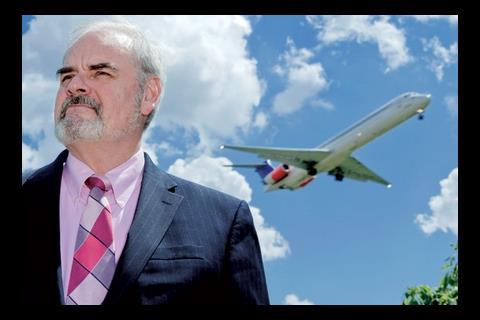...or to put it another way, BAA’s five-year framework is just a large feather bed, and the military brain behind its new procurement policy wants contractors to fight for their work
Steven Morgan is polite, charming and perfectly friendly – reassuring qualities in a 6ft 5in former admiral in the US Navy. He is also the man who has, in his first 120 days as BAA’s capital projects director, blown apart its multibillion-pound framework for major projects.
It would be hard to overstate the impact of that decision, not least to the nine contractors that spent a year winning a place on it in the fond belief that they would get a share of work worth £4.8bn over the next five years. Of course, it is good news for all the firms that did not make the framework, and can now put in bids for megaprojects such as Heathrow terminals 2, 3 and 4.
But the wider implications are even more important: BAA was the company that pioneered frameworks in the late nineties, and therefore the whole drive towards collaborative working. Now it has effectively told the rest of the industry that frameworks do not offer the best value for money – and it is inconceivable that this will not influence other large clients. So why did Morgan do it?
Action
The answer is that he believes in the bracing effects of competition. “I want the best,” says the 60 year old in his native Ohio accent. “I want the A-team, not the reserves. I want the best talent contractors can offer. I want people to have to work to get my business. To earn my business. And I want them to give me the best work they can for the best value once they have won the contract. I will not be taken for granted.”
The blizzard of superlatives, the military metaphors and the tone of command are appropriate from a man with his background. And his attitude to frameworks is equally suggestive of a military approach to discipline. He argues that divvying projects up to keep a pre-selected group of contractors fed over a long period of time is akin to a “corporate beauty pageant”.
Whatever else he is, at least Morgan is consistent. Before he joined BAA he was commercial director of British Nuclear Fuels, where he was given the job of cutting cost by £225m over five years at the Sellafield reprocessing plant. Which he did. “BAA is like Sellafield five years ago,” he says. “People say, ‘you’re doing all the same stuff you did then’, and I think that’s right. I’m adapting my methods to an airport company. And there is no doubt that this will give me more from my contractors. Competition will raise standards and get better value for money.”
To this end, he intends to bundle together many of BAA’s smaller projects on the grounds that this will save the company money and attract more of the “best, bigger international companies out there”.
Morgan is quick to dispel any murmurings that his appointment and brief came from anywhere other than BAA’s top brass, namely through Ferrovial, the Spanish contractor that bought BAA in June 2006. “Ferrovial is one of several shareholders of BAA,” he says. “It is also a subcontractor. We treat it like any other subcontractor, expecting the highest value for money. I was not recruited or assigned by Ferrovial.”
Reaction
Although Morgan may be convinced that his decision was right, he is fully aware that it has not gone down well with much of the industry. Presented with this point, he takes a deep breath and leans forward to respond: “I had meetings with each of the directors of the companies on the framework, and they certainly see this as a change in the strategy as they understood it – and it is,” he says deliberately. “But none of them are afraid of a bit of competition. And I think they can all see the opportunities because now they have the option to bid for any part of the BAA construction programme they like; they are not hemmed in.”
As for the fear among industry figures that that this sort of behaviour could kill collaborative working, Morgan is not having a bit of it. “Having guaranteed work over a five or 10 year period is a luxury that most companies would aspire to,” he says. “Now, I don’t want to create an adversarial relationship with my supply chain. I don’t want to revert back to what was typical 20 years ago where you had a tough stance with contractors, you didn’t really care what they wanted or whether they made any money. But BAA has to earn customers every day and I would expect any good company to earn its business. For that reason I don’t think frameworks should be used for major capital construction projects looking a decade into the future. You’ve got to know what the price is going to be. I don’t think you turn your wallet over and hope that your contractor will be nice to you.”
Benefits
He goes on to point out that his decision will spread BAA’s money among more suppliers. “We are one of the few clients spending more money on construction this year and next,” he says; £70m a month to be precise, rising to £120m later in the year. “Now companies who were not on the original framework can get in on that, and there will be a lot to be won, and companies that were on the framework can bid for whatever they want. Beforehand they were only allowed to go for certain jobs. The changes have opened up huge opportunities for the construction industry.”
In fact, so keen is Morgan to foster the spirit of free enterprise that he wants to encourage bids from firms from outside the construction industry entirely. “I’m looking for companies that can bring together a number of subcontractors and deliver on major capital programmes,” he says. “We would therefore be interested not just in construction companies but in firms who support oil and gas, the Ministry of Defence, the ones in the business of making infrastructure. And the ones in the nuclear industry. I want to bring in a few more of these sorts of firms from outside to bid for jobs.”
Winning
Having painted a warts-and-all picture of what the industry is up agains, Morgan does take the time to give a few hints on what ts potential members could do to impress him. “I want ideas,” he says. “They don’t even have to be formal proposals but I want to know how you can save us money, how you can improve our business. For example, someone could say, ‘Hey, have you thought about using full automation and robots to manage all your baggage systems?’ Or, ‘Have you thought about using wind turbines in the design of your terminals.’ And these are all ideas people can offer even before we start running competitions – our doors are always open.”
And to make life easier for new and smaller firms wanting to be considered for BAA’s huge volume of work, Morgan has plans to introduce a supply chain ombudsman to “identifying good marriages”, a system he refers to as a “clearing council”. “If companies wanted to link up with someone more senior in the supply chain, and come to us with a really good idea, we might be able to introduce that company to firms that are already part of the supply chain through this ombudsman. That would be a good, safe way in.”
Separation
Another distinctive feature of BAA’s old approach to projects was its involvement in the running of the jobs. During the epic Heathrow Terminal 5 project it functioned more as a part of the project team than a traditional client. Not any longer. For Morgan, this system lacked rigour.
“I don’t want to be a construction company,” he says. “I am the customer. My job is to define exactly what I want from the start of the process to avoid expensive changes. My job is to select a contractor to deliver that and pass the message down the supply chain. That’s what the client should be focused on, not getting distracted by being overly involved on site. That’s not the client’s job. I don’t want my company to be populated by project managers – that is what my supply chain should do. In fact, I don’t even want to use that job title for my staff.”
This is a point that Morgan clearly feels strongly about. As a military man, he likes clear chains of command and well delineated authority. So, the words “partnering” and “alliance” trouble him in relation to a client–contractor relationship because they can blur the lines of who is responsible for what, and lead to mistakes being made. “When you’re in some kind of partnership there can be chaos as it’s not always clear what’s being done,” he says. “Separation makes things clearer, I am doing that because I want to discipline the way we do business.”
Morgan in a minute
What do you miss most about the US?
Butterfingers (a type of chocolate candy bar) and American football.
What do you never leave the house without?
My car keys and my BlackBerry.
What watch do you wear?
A Casio Protec with altimeter, barometer and stopwatch.
What’s on your iPod?
I don’t have one; I have a Zoone which is the Microsoft competitor. On that I have classical guitar, new age and American Indian music.
If you won the National Lottery tomorrow what would you buy?
A sail boat.
Which five guests would you invite to your fantasy dinner party?
The Queen, Carla Bruni, Catherine Zeta-Jones, Barack Obama and Bill Gates.
The new BAA construction programme system
“Competition is one of the best ways of achieving value for money,” says Morgan. “Previously we didn’t consider a price, we didn’t consider a technical approach, we didn’t consider risk allocation. We’re not going to throw the framework arrangements out, but now it’ll just be used for what it was intended to be – for the projects under £10m. For anything between £10m and £25m we will have a limited competition among two, three or four framework contractors. Projects worth more than £25m will be opened up entirely to competition through the EU’s Most Economically Advantageous Tender model.”
In reality fewer projects will fall into the sub-£10m and £10-25m categories as Morgan’s strategy involves bundling these smaller schemes. “I don’t want lots of small six-month schemes,” he says.
Downloads
BAA’s projected spend at Heathrow
Other, Size 0 kb
Postscript
Original print headline: 'I will not be taken for granted'






























No comments yet